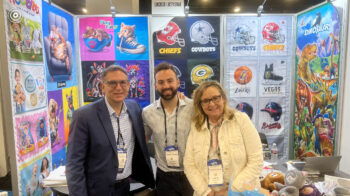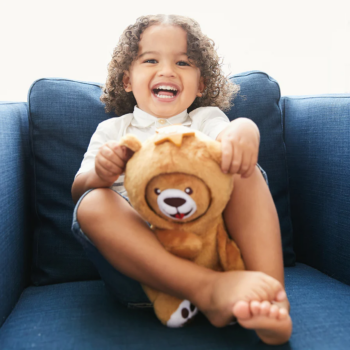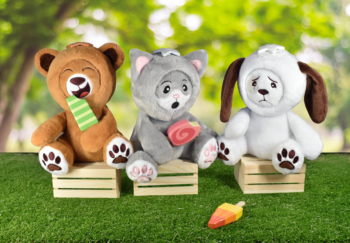By Gary Symons
TLL Editor in Chief
There are times, as an editor writing about licensing, that you see a product you just feel compelled to write about.
That’s the case with a new brand called Moodles, a young brand and product that will be exhibiting at Brand Licensing Europe this year at the LoCoco Licensing booth.
In this case, it’s not just the product, but also the story behind its development that makes it so special.
Moodles are essentially plush toys equipped with a proprietary, patented mechanism that allows the user to quickly and easily change the toy’s face to six different emotions.
A child can choose between happy, sad, surprised, angry, amused and sleepy. Having one or more Moodles allows children to create interactions between their Moodles, elevating the quality of their play time.

Experts in child development very quickly embraced the toys, which were also nominated for Toy of the Year by the Toy Association in 2020.
Moodles were originally developed under the brand name Whatsitsface by Joanne Paul, a branding and design specialist who left her busy job in New York City and moved to Colorado when she had her two children.
An innovator by nature, Paul says the idea came to her while playing with her daughter.
“I was really inspired by her imagination and the play scenarios she would create with her dolls, her stuffed animals,” Paul says. “It was just mind blowing, because I was a first time mom, and prior to that I wasn’t really living in that world. Long story short, I thought how nice it would be to have a toy that could respond emotionally back to her, and the different play scenarios you could create from that. So if they’re having a fight with someone, or if someone’s sad, you know, they could actually respond emotionally.”
But what really grabbed us here at The Licensing Letter is how Moodles can be used to teach emotional intelligence to children, and help train the developing minds of young people to be happier, more resilient, and better at communicating their thoughts and emotions.
That quality pushes Moodles beyond the status of a plaything, and makes them ideal for parents of children with developmental disorders, child therapists, and child psychologists.

Paul says helping children with autism and other developmental issues has become a primary mission in her life and her business, and it’s what drove her to continue development of the toys even when the situation seemed hopeless.
“I’ve gotten to know many families who have different struggles, including in the autistic community,” Paul explains. “I found that a lot of children on the spectrum can’t identify facial expressions, so I thought about three things: the creativity that I was originally inspired by to create a toy with different emotions; and then I thought about my son, who wasn’t really engaged with books or emotional play at a young age; and the autistic community, the kids with language delays and the many challenges that parents were facing.
“The idea that I could really do something to help is what finally drove me to make this happen, and that’s when I went to Home Depot and got a bunch of bits and pieces to figure out how to get a toy to change facial expressions.”
Any inventor who’s actually brought a product to market can tell you the process is far from easy, and the first challenge is usually getting a patent for your invention. Paul was no exception, and spent over three years and a great deal of money getting her design accepted by the US Patent and Trademark Office.
“I first came out with a version of the doll with three faces and took my idea to a patent attorney, and they said, ‘Well, Joanna, this is a great idea, but you can’t patent it. It’s already been done’,” she recalls.
“But I thought, this is not the end; I have to figure this out. And then one day I was sitting on a plane, and it just came to me, what if we flip the faces? So that gives you six faces, but unfortunately, much easier said than done,” Paul said. “It took three and a half years of going back and forth where the patent agent was showing me prior art of things from the 1960s, but they were like store displays and things that had nothing to do with with toys.

“So after a long three and a half years, and as you can imagine, thousands and thousands of dollars, I had a meeting with the patent attorney and his supervisor on Zoom. Once I did that, they got it, and I was approved the next day.”
The toys came out at the beginning of the pandemic, and despite being quite expensive due to the small production runs, they sold well and were eventually picked up by major retailers, including Walmart, which also helped validate all the work and all the risk Paul had taken on.
“It’s been really exciting seeing my toys on the shelf,” Paul said. “In fact, it was actually very overwhelming.
“The first time I went to Walmart to see them I was planning to do a social media post, and then I saw my toy on the shelf and I was just overcome with emotion. So, there was no post that day; it was just me in the toy aisle and a whole lot of tears!”
However, Paul didn’t have the capacity to increase production, which would also allow her to lower the price, and was keen to get a deal with a top notch master toymaker. Unfortunately, her meetings with toy companies went nowhere until she ran into Peter Lococo of LoCoco Licensing at the 2023 Licensing Expo.
Incredibly, it took Lococo only a single day to attract the company that is now the toy licensee for Moodles.
“When I met Joanna, I knew she had a powerful message about helping people, whether their child has a learning disability or not,” Lococo said. “I just thought it really resonated with a family trying to teach a child about emotions. I asked my wife (the company’s COO Julie Lococo) what she thought of it as well, and she saw the utility of it immediately.
“From our standpoint, we don’t take anything on that we don’t believe in, and in this case, we were completely sold. We decided to work together on the spot, and we proposed it to the toymaker Sunny Days later the same day!”
It’s a testament to the power of the Moodles as an interactive toy that Sunny Days Entertainment also saw the potential right away.
“The reception was extremely positive,” Lococo recalled. “They saw it and they felt it immediately. My relationship with Sunny Days goes back years, so we had this relationship, and coincidentally we had an appointment with them the same day I met Joanna. When I showed it to Sunny Days they really loved everything about it, and the only issue they had was about the name.”
LoCoco Licensing closed the deal by September, just three months after Expo, and oodles of the newly named Moodles began pouring off the assembly line and into retailers.
That’s great news for any inventor in a business sense, but Paul says the other aspect of the deal is that parents can now get Moodles at a much lower price point. The Zoey and Aria Moodles available at Walmart, for example, retail for only $19.97, making them accessible for any family.
But Paul and Lococo say that licensing is critical to expand the usefulness of the toys for teaching emotional intelligence and for child therapy. Paul wants to focus on kids aged 2 to 5-years-old with books and an animated series that can serve as supports for therapists or families.
Ninja Life Hacks Launches Emotional Learning Products at Walmart for Mental Health Month
“That’s a crucial period for brain development because kids of that age still have a lot of neuroplasticity, their brains are still developing, and the idea is to train the neural pathways toward positivity,” Paul explains. “A lot of mental health problems, like anxiety, can really be affected by early intervention, so even though you can’t know if your child is going to become anxious or depressed later in life, you do want them to be resilient, empathetic, and to give them the best head start in life.
“There are some things that we can’t cure, like autism or perhaps ADHD, which is more ingrained in the genes, but you can certainly help children who are neurodivergent have a better life,” she adds. “This is a really fun toy, but we want people to understand that this is not just a toy. It’s a resource to help your kids develop a better brain.”
Paul is already experimenting with stop motion animation using the Moodles. “It’s so fun when you see the actual product move, and it really lends itself to that style of animation using the toy itself.”
Paul’s sense of mission has infused LoCoco Licensing and Sunny Days as well, who are pursuing an unusual path for licensing.
Even though Sunny Days has the exclusive rights to the technology for toys, Moodles wants to license the technology to other brands. Lococo explains the strategy with the example of the hit Pixar movie Inside Out 2, which also delves deeply into the topic of mental health for kids.
“The idea is essentially to work with existing brands and license the intellectual property to brands like Inside Out,” Lococo says. “Joanna brought us this idea, and we proposed it to Sunny Days, and although at first there was the concern that this kind of infringes on what they’re doing, they saw the logic and how powerful it could be and have accepted it.
“So, that opens up at BLE (Brand Licensing Expo) an opportunity to meet and discuss with major brands the utility of this IP for their brands and their products. It’s an opportunity to really help this IP grow, but also make sure that the core part of who we are as a brand is developed and partnered with the right people.”
LoCoco Licensing is highlighting Moodles at booth D205, and the firm says it is focusing on a wide range of categories, topped by publishing, animation, and technology IP licensing for other entertainment and toy brands. Examples would be the aforementioned Inside Out film franchise, but also other brands that are dedicated to emotional development, like the Care Bears, Daniel Tiger’s Neighborhood or Bluey, just to name a few.
Paul will also be attending the show and available for meetings, where she hopes to take her message about child emotional health to the licensing community.
“It really has been a very rewarding experience, despite all the hurdles we’ve had to overcome,” she says.
“What keeps me going are the messages I get from people,” she adds. “For example, I got an email from a woman who was a child psychiatrist who developed a neurological disease, and she could only express one emotion, and it was sadness and crying, just crying constantly, whether she was happy or sad or angry.
“So she bought one of my toys, and this has become her new face to the world, right? My heart stopped when I got that, I was literally in tears, because she can actually express herself with Moodles when her loved ones are near her. She can say, I’m sad or I’m happy. And that’s what this journey is all about.”
Anyone interested in exploring licensing opportunities with Moodles can reach LoCoco Licensing through the BLE online meeting platform, or by email at peter@lococolicensing.com.
